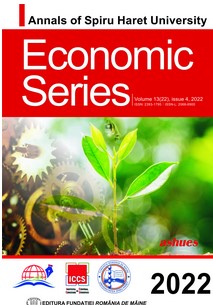INTELLECTUAL CAPITAL EFFICIENCY AS THE DETERMINANT OF SUSTAINING PROFITABILITY IN THE COVID-19 PANDEMIC CONDITIONS: DOES THE AGE OF THE ENTERPRISE MATTER IN THE HOTEL INDUSTRY?
INTELLECTUAL CAPITAL EFFICIENCY AS THE DETERMINANT OF SUSTAINING PROFITABILITY IN THE COVID-19 PANDEMIC CONDITIONS: DOES THE AGE OF THE ENTERPRISE MATTER IN THE HOTEL INDUSTRY?
Author(s): Jasmina Ognjanović, Bojan Krstić, Tamara Rađenović, Milica Jovanović VujatovićSubject(s): Business Economy / Management, Health and medicine and law, Tourism
Published by: Editura Fundaţiei România de Mâine
Keywords: intellectual capital; efficiency; profitability; hotel; Covid-19 pandemic;
Summary/Abstract: The purpose of this paper is to provide the answer to the question - Can the efficiency of intellectual capital (ICE) be a factor in maintaining the profitability of young and mature hotel enterprises in the crisis caused by the Covid-19 pandemic? The key goal of the paper is to point out the importance of[EG1] intangible (intellectual) resources for improving business performance, and above all, profitability. To respond to the goals of the research, an analysis of the contribution of human capital efficiency (HCE) and structural capital efficiency (SCE) to the profitability of young and mature hotels in the year before the crisis and the year of crisis in the Republic of Serbia (RS), as an emerging country will be given. The study's findings suggest that the ICE components have a partial impact on the profitability of young hotels in the year before the crisis. In the year of crisis, the ICE components partially affect the realization of sustainable and profitable business among mature hotels.
Journal: Annals of Spiru Haret University. Economic Series
- Issue Year: 22/2022
- Issue No: 4
- Page Range: 83-104
- Page Count: 22
- Language: English

